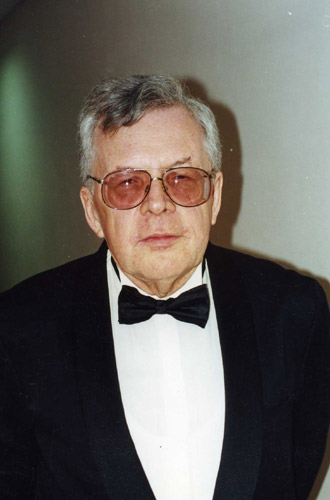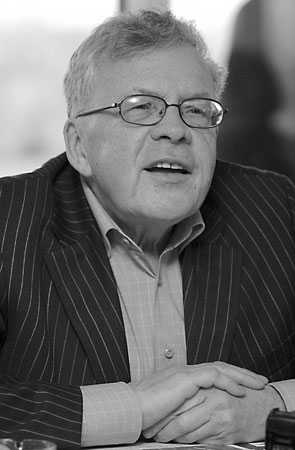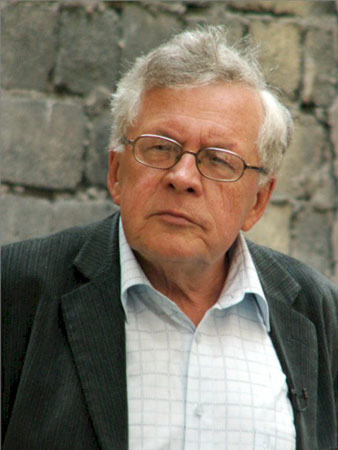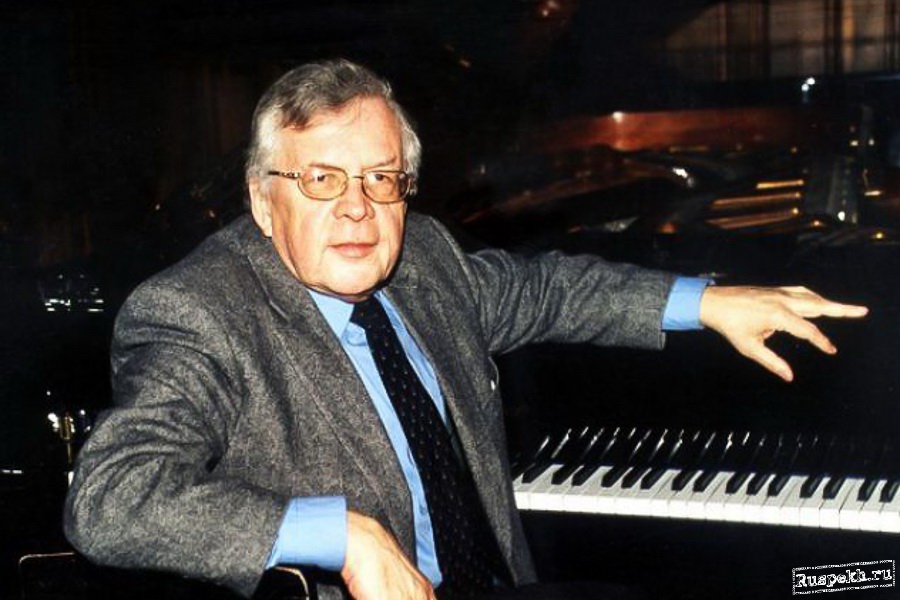PETROV Andrey
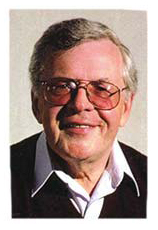 Andrey Petrov (1930–2006) was born in Leningrad. In 1954 he graduated from the Leningrad Conservatoire, where he studied composition at professor O. A. Yevlakhov’s class. Among the titles he was awarded were the laureate of State USSR Prizes (1967, 1976), Russia (1996), Russia President’s Prize (1990), People’s artist of the USSR (1990). The cinematographic prizes were the “Nika” (1992) and “Golden Ram” (1995). Having become the chairman of the Leningrad Composers’ Union in 1964 he headed it till the last days of his life, while in 1992 he started the activity of the St. Petersburg Philharmonic Society’s president. Andrey Petrov was the Honoured Citizen of St. Petersburg. The planet discovered in 1994 was given his name.
Andrey Petrov (1930–2006) was born in Leningrad. In 1954 he graduated from the Leningrad Conservatoire, where he studied composition at professor O. A. Yevlakhov’s class. Among the titles he was awarded were the laureate of State USSR Prizes (1967, 1976), Russia (1996), Russia President’s Prize (1990), People’s artist of the USSR (1990). The cinematographic prizes were the “Nika” (1992) and “Golden Ram” (1995). Having become the chairman of the Leningrad Composers’ Union in 1964 he headed it till the last days of his life, while in 1992 he started the activity of the St. Petersburg Philharmonic Society’s president. Andrey Petrov was the Honoured Citizen of St. Petersburg. The planet discovered in 1994 was given his name.
Symphony (poem “Radda and Loiko”) and ballet (“The Shore of Hope”) genres were his first passion. During the 1960ies he works out mainly the sphere of songs and cinema music, however, the second half of the decade gives birth to the distinguished poem “In Memory of the Perished During the Leningrad Siege”. The 1970ies and 1980ies were devoted to the theatre, though the composer continued searches in the song and cinema music genres.
The academic music attracts him more and more. These are concertos, where soloists act as the personages of instrumental plays (Violin and Piano, Concerto Buffo); symphonic variations, revealing the author’s orchestral inventiveness (Romantic Variations, variations to Musorgsky’s theme “Russia in Bells”); two symphonies and “The Time of Christ”. The composer resorts to these genres on the border of the 1980ies–1990ies. The beginning of the 21st century was signed by his last opuses, where the features of symphony and cantata are dashingly amalgamated (symphony-phantasia “Farewell to…” and vocal-poetic suite “If the Stars Are Switched On…” to Mayakovsky’s verses).
Andrey Petrov confessed once, that those were history, literature, painting, having drawn him since the green years. His symphonies are poetic, while theatre frescoes — symphonic ones. Everything is narrative, visual and scenic. Hence the theatre grows to the most vital area in his creation.
Andrey Petrov managed to have chosen the subjects, able to embrace the universal problems. After his early ballets “Postmaster” and “The Shore of Hope” Petrov conceives his mature theatre, beginning with the “Creation”, thus engendering his own Universe, treating it tenderly and wittily. This sparkling with joy, poetic, light and humorous performance has won the Leningrad stage, being a success via the European cities. The other epochs stir him a great deal, e. g. the beginning of the 18th century — the new epoch of the Russian, i. e. Petersburg history (“Peter the First” — the theme so dear to any inhabitant of Leningrad-Petersburg), the beginning of the 19th century (“Pushkin”) and the 20th century (“Mayakovsky to Begin”). Therefore the great figures of the Russian history and culture are depicted in Petrov’s music theatre. Creation and art unites Peter, Pushkin, Mayakovsky, Master from “Master and Margarite”. Bulgakov’s novel initiates the appearance of the main character in the symphony-action “Time of Christ”.
Petrov’s theatre opuses are distinct for original scenic conception. Just remember the choreographic parable, vocal-choreographic symphony, opera extravaganza…Contrasting dramaturgic elements, clearly outlined thematism, precise orchestra description made for their long and successful existing at numerous native and foreign stages.
Great number of listeners was charmed by Andrey Petrov’s cinema music. Brilliant master of this genre, he demonstrates utility music, but wrought most fine and favouredly. His melodies grow up without fail, cradled in mere everyday intonations. Endowed with poetical meaning they remain hilariously recognizable, while their cultured blend evokes any connoisseur’s reason, guessing their true nature. Petrov’s melodies strike by exact expression of this or that film’s mood. Their communication with million of spectators is intimate. Their taste and delicacy rises cinema scores to the true art. Songfulness is present in all Petrov’s opuses. His instruments sing, while the voice occurs to be the necessary element in symphonies and even ballets.
Great number of listeners was charmed by Andrey Petrov’s cinema music. Brilliant master of this genre, he demonstrates utility music, but wrought most fine and favouredly. His melodies grow up without fail, cradled in mere everyday intonations. Endowed with poetical meaning they remain hilariously recognizable, while their cultured blend evokes any connoisseur’s reason, guessing their true nature. Petrov’s melodies strike by exact expression of this or that film’s mood. Their communication with million of spectators is intimate. Their taste and delicacy rises cinema scores to the true art. Songfulness is present in all Petrov’s opuses. His instruments sing, while the voice occurs to be the necessary element in symphonies and even ballets.
Andrey Petrov’s cooperation with distinguished performers, choreographers, producers was forming most happily, growing to long creative unions. His ballets were staged by such choreographers as Igor Belsky, Natalia Kasatkina and Vladimir Vasilyov, Boris Eifman. Dancers Irina Kolpakova and Mikhail Baryshnikov took part in his stagings. Yevgenia Gorokhovskaya, Irina Bogachyova, Sergei Leiferkus acted in his operas. His compositions were presented by such violinists as Boris Gutnikov, Sergei Stadler, Maksim Vengerov, conducted by Arvid Yanssons, Pavel Kogan, Yevgeny Svetlanov, Yuri Temirkanov, Yevgeny Kolobov and Alexander Dmitriyev.
The world of Andrey Petrov’s music is lucid and constant. It’s accepted as diatonic and consonant one. Meanwhile the range of his phonations is wide, so as the amplitude of his partialities — genres and styles. He rules them according to the right of a musician, living on the crossroads of the Ages and continents: from Bach to jazz, from the Russian chants to sonority.
His main objective is the Universal harmony, this classic model of the romantic obstinacy.
Published Works:
Street Tunes in Dinner-Jackets.Cinema music arranged for symphony orchestra. Score (Published in Collected Works. Volume 11)
Vocal Cycles: “Simple Songs”. Vocal cycle for soprano, basso and piano. Verses by G. Rodari (1956). “Five Merry Songs for Children”. For voice and piano (1961) (Published in Collected Works. Volume 16)
Songs of the 1950ies—60ies. . For voice and piano (Published in Collected Works. Volume 17)
Songs of the 1970ies–80ies. For voice and piano (Published in Collected Works. Volume 18)
Songs of the 1980ies—2000ths. For voice and piano (Published in Collected Works. Volume 19)
Last Symphonic Compositions. Score (Published in Collected Works. Volume 20)
Street Tunes in Dinner-Jackets.Facilitated arrangement
Saint-Petersburg, the Brilliant. Score
Ex profundis memoriae. Forgotten Melody. Humoresque. Version for string orchestra by Grigory Korchmar
Waltz to the film “Beware of the Car” and Overture to the film “Taming of Fire”. Transcription for two pianos
Waltz (from the film “Beware of the Car”); Call of the Blue (from the film “Blue Bird”). Facilitated arrangement for flute (violin), clarinet and piano. Piano score and part
Two Melodies from the Film “Forgotten Melody for Flute” and “The Blue Bird”. Waltz from the Film “Aware of the Car”. Arranged for flute (violin) and piano
Elegy from the film “Say a Word for the Poor Hussar”. Facilitated arrangement for violin, violoncello and piano (harp). Piano score and parts
I 'm Walking along Moscow (from the film of the same name). Facilitated arrangement for two flutes (violins, xylophones) and piano. Piano score and parts
Song About the Sea-Devil. From the film “The Amphibian Man”. Facilitated arrangement for three trumpets (clarinets) and piano. Piano score and parts
Evergreen Songs. Popular Melodies from Cinema and TV Films
Books about А. Petrov
Serdobolskiy O. Composer Andrey Petrov. Portrait Draft
Music by А. Petrov on CD
The Time of Christ. A symphony in 6 moments
